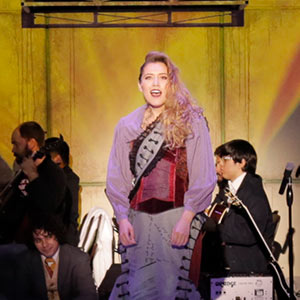A dark cloud reigns over this ‘Parade’
— Fullerton College Hornet - Jeff Weinstein - Saturday, March 12th, 2016
The Truth Will Set You Free: Unless You Live in Atlanta.
It has long been known that the South has more skeletons in its closets than in its graveyards. Nowhere is this more evident than in the controversial Leo Frank trial of 1913. Jewish superintendent of the National Pencil Company factory, Atlanta, Georgia, Leo Frank Carver (Johnathan Fierros) was wrongfully sentenced to death for the rape and murder of 13-year-old employee Mary Phagan (Emily Abeles). This constitutional travesty commemorates how brazen the evil can be when they think no one is watching.
Thanks to the Tony Award®-winning book by Pulitzer Prize®-winning playwright Alfred Uhry (“Driving Miss Daisy”) and the Tony-winning score by Robert Jason Brown, the world will be watching.
Broadway is no stranger to dark musicals, having sired “Carousel,” “Cabaret” and “Kiss of the Spiderwoman.” Stephen Sondheim’s gruesome “Sweeny Todd” was the previous champion of darkness, but 1998’s “Parade” takes us to the blackest inner sanctum yet put to song (if for no other reason than that it is a true story.) “Parade” is a chrysalis of irony, a butterfly deep-fried in corruption and bigotry, enveloped by a comely cocoon of zippity-doo-dah jingoism. It opens with a festive Memorial Day parade. The glory of Dixie is celebrated in the pastoral anthem, “The Old Red Hills of Home.” This is a prettified manner of makeup covering (cloaking) what we soon will discover to be the true face of good ol’ boy society.
Most martyrs are charismatic, but Frank is hard to love for being too human and for his greater devotion to business than to his loving but neglected wife Lucille Frank (Alexandra Specter). His minority background and aloofness toward Atlanta, into which he refuses to assimilate, makes him an easy target. Sadly, history continues to testify that racial and religious differences can be construed as a capital offense.
On this note, Professor Tim Espinosa, “Parade’s” director and choreographer, observed, “I saw the article about what happened in Anaheim with the KKK rally. And then there’s the Black Lives Matter movement: there are so many things that are happening currently that resonate so much in this show.” The Leo Frank trial took place 100+ years ago, and yet one has to wonder why society still harbors ill will for the different.
Fierros wears Frank’s dour skin with comfortable earnestness. Specter’s Lucille evokes the precious pure-heartedness of a young Judy Garland. They both coo and belt Brown’s sensitively complicated melodies with mellifluous conviction.
Frank’s railroading is wicked and relentless: “Christian” newspaper publisher, Tom Watson (Coleman Summers) fans flames of hatred with incendiary yellow journalism that consumes the villagers with bloodlust, as they all but storm the castle, torches in hand.Ambitious prosecuting attorney, Hugh Dorsey (Austin Baran), is tireless. This barracuda cuts a deal with factory janitor and star witness Jim Conley (Damonte Watson) to commit perjury. He also coaches other “witnesses” from the factory, sparing no manner of ruthlessness to land his Moby Dick . And the dishonorable Judge Roan (Andrew Hall) embraces whatever pleases an angry lynch mob as justice.
An ebullient Watson rallies the courtroom in the rousing production number “Hammer of Justice,” inciting a feeding frenzy with lines like: “Dead man walking by,/There’s a void inside his eyes./Judgment, a final sigh:/Hear the screams electrified.” One by one, townsfolk invade the witness box, chomping at the bit to hammer a nail into Frank’s coffin. Conley’s perjury is especially damning, buoyed by the infectious “That’s What He Said.” The introverted Lucille cracks out of her shell to become Frank’s advocate. She ultimately convinces Georgia governor John Slaton (Aaron Stevens) to reopen the case, imploring him with the hauntingly sweet ballad “You Don’t Know This Man.” The governor ultimately recognizes the court’s duplicity and how threadbare the prosecution’s circumstantial evidence.
Despite realizing Frank’s charges are trumped, he only commutes the death sentence to life in prison for fear of major repercussions—but his political career ends for showing even this modicum of compassion.
The end of Frank’s road takes a shocking, unexpected detour. It is this brand of Southern hospitality that motivated Neil Young to write his iconic song, “Southern Man.” After disembarking from this emotional roller coaster, we are returned to the light-hearted parade that launched us on this Orpheum-like journey. We are two hours older but years wiser now, unable to ignore the grand implication of this innocent revelry, placed in a nutshell best by cartoonist Walt Kelly (Pogo): “We have met the enemy, and he is us.”








